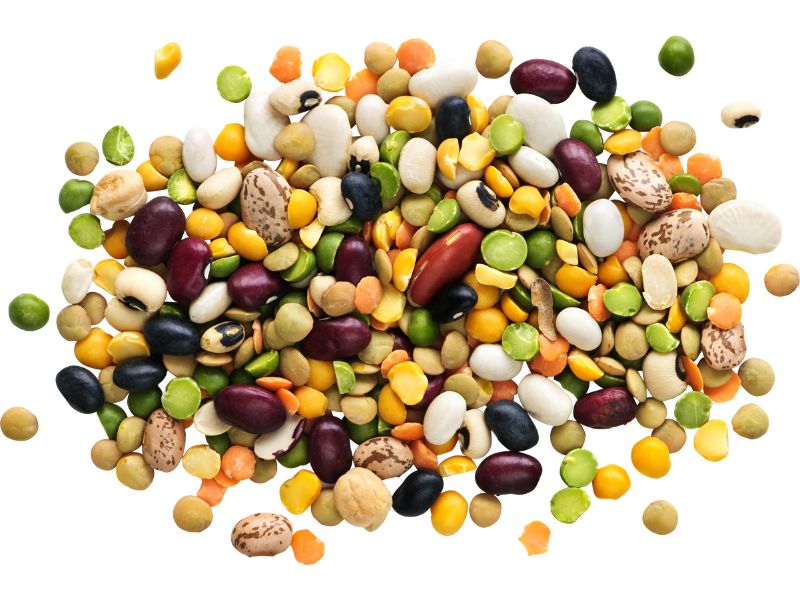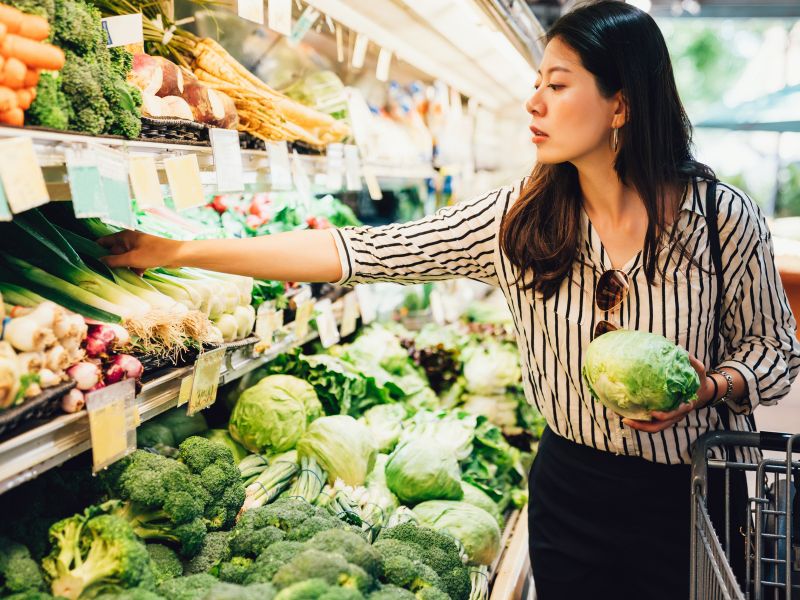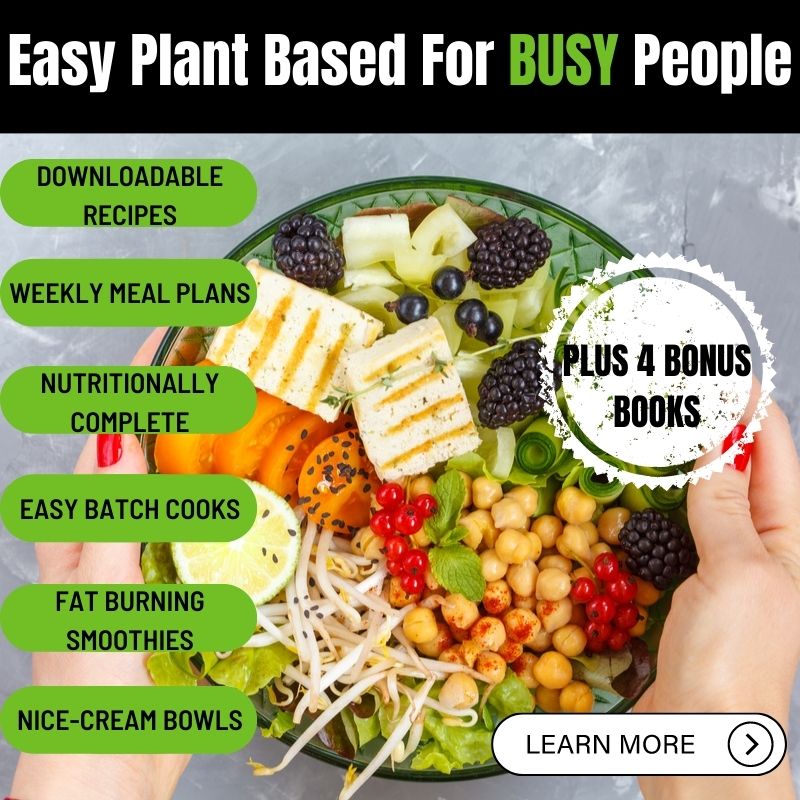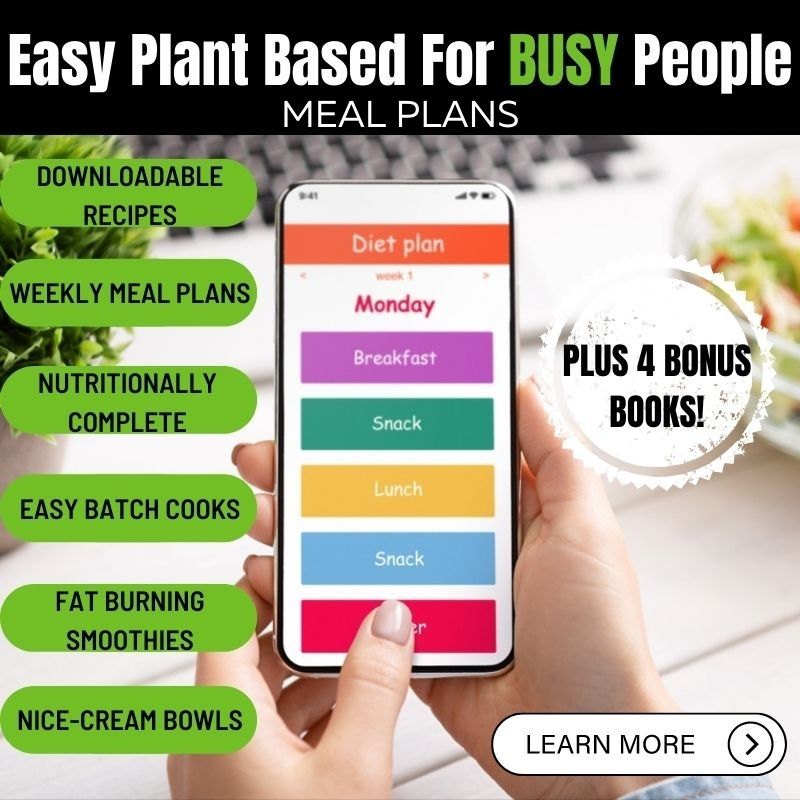Have you recently begun, or thought about beginning, a whole food plant based diet? If you have, then you may be scratching your head wondering not only what to buy, but also how to obtain all the nutrition your body needs on plants alone.
Fear not, this is normal, but this plant based diet food list is your complete shopping guide of everything you could need to keep you 100% healthy.
Why Go Plant Based?
I turned to healthful plant based eating over 5 years ago, and so far I haven’t fallen to pieces or wasted away through the non eating of animal products, not like some may have predicted.
In fact, my body is thriving more than EVER! And in these past couple of years I have seen and felt my health reach new heights.
I’m not saying that this way of eating will be the cure all for serious health conditions, I wouldn’t know about that. But I have certainly seen some improvements of my own chronic health issues (which at the time I presumed were just a normal part of life that I just had to live and get on with).
In no particular order, these improvements include:-
(I am not saying you will get the same benefits, this is my experience only)
- HORMONAL BALANCE – I have more evened out hormones than before, especially when it comes to PMS. Less food cravings, bloating and irritation are among these improvements that I put down to not having animal hormones in my body any more.
- RADIANT SKIN – I’ve always been blessed with pretty good skin, which was probably due to the fact that even before I went plant based I was eating copious amounts of fruits and veggies anyway. But these days it is better than ever, and I’m getting older, which brings me on to my next point.
- ANTI AGING – The high antioxidant intake of eating so many whole plant foods really helps to slow the aging process, on not only the outside, but the inside too, in places where you can’t even see it, but where it is of even more importance.
- LESS ACHES AND PAINS – I always had a lot of general muscle aches and pains before (due to the fact that I do a LOT of exercise), but these days I don’t really feel anything much, even after a really hard workout. I’m pretty sure this is due to the anti inflammatory effects of my highly plant based diet.
- FITNESS – My fitness has gone to new levels these last couple of years, and certainly not because I am physically doing more exercise than I was previously. Again, I believe this ties in with LESS INFLAMMATION!
- GUM DISEASE – This is the weirdest one: I used to have inflamed gums that bled quite a lot when I brushed my teeth, of which my dentist confirmed was gum disease. I had this for years and no matter how healthily I thought I was eating and looking after my teeth, I never could get rid of it. The last time I went to visit my dentist she was shocked at the improvement. She not only told me it had completely gone, but also that she had no idea how it could disappear so quickly. I said it must be my plant based diet. She didn’t really believe it, I could tell, but I know in my heart that it was definitely that, especially considering all the other amazing things that had already happened to my body. Either way, I was buzzing for days because I knew my clever body was slowly but surely regenerating and healing itself through eating high amounts of anti inflammatory, plant based foods.
- CLARITY – Sometimes extreme clarity, the kind of which I have never experienced. I have moments, or glimpses, of complete clarity and awareness that I never knew were possible before. True bliss, especially after my years of brain fog. It comes and it goes, but as a whole I can think so much more clearly and don’t get the forgetfulness that I used to, especially when hormonal.
How to Change to Plant Based Foods
As more and more people turn to this healthful, planet friendly way of eating, they will be looking for ways to swap their usual meat and dairy products with plant based alternatives. And, this may seem a bit of an overwhelming task at first.
It’s going to take time to re-educate yourself, not only about food groups and macronutrients, but also your taste buds and digestive system will take a while to adjust.
Wondering what on earth you’re going to eat instead of your usual animal based fare is often one of the biggest obstacles of such a huge dietary change.
Life long conditioned thinking patterns are powerful, and you may have an uneasy feeling that you’re not getting enough protein and other nutrients in your meals. Or, you may even feel like you haven’t had a ‘complete’ meal without your usual meat or dairy, but you actually have.
All this will pass. As soon as you start to feel amazing with more energy and clarity than ever before, then believe me, it will pass.
Meeting Protein Requirements

Getting enough plant based protein is something you may need to be mindful of, especially if you partake in lots of physical exercise. You will find your needs will be higher under these circumstances.
You should try and get a protein source in at every meal. It’s easy to eat too many carbs on the plant based diet, especially when you’re not quite sure how to do it correctly. And, by carbs, I mean the refined, bad kind, not the complex kind which are absolutely fine.
Wholegrains, tofu, nuts, seeds, leafy greens, legumes, soy milk, quinoa, amaranth, buckwheat and most veggies all contain protein in varying amounts.
Plant Based Food Swaps
Below are a few examples of easy food swaps to get you started. Don’t forget that a whole food plant based diet is also about eating healthy, low sugar foods, and lots of wholegrains.
You will find I have added some swaps for unhealthy foods here too. Please scroll further down for your actual shopping list.
- COW’S MILK – Swap for almond, soya, oat, hemp, pea or rice milk (soya milk is the highest in protein and most nutritionally closest to cow’s milk).
- YOGURT – Swap for coconut or soya yogurt (again, soya is the highest protein and nutritionally closest to milk based yogurt).
- CHEESE – You can buy all sorts of versions of vegan cheeses these days.
- WHITE BREAD – Buy wholegrain bread; or even better, sourdough, which will be easier on the digestion.
- BAGELS – Again, you can buy wholegrain varieties.
- JAM – Buy whole fruit jam with no added refined sugars. Or, make your own simple raw berry jam.
- HIGH SUGAR CEREALS – Swap for porridge oats, homemade quinoa breakfast bowl, millet porridge, buckwheat grouts, chia pudding, homemade granola, buckwheat pancakes, buckwheat-peanut butter waffles.
- MEAT (PROTEIN) – Use soya mince, tofu, vegan sausages, homemade veggie burgers, chickpea burgers, tempeh, quinoa, pulses, lentils, beans, nuts and seeds. You can probably make all your usual meals out of these substitutes.
- EGGS – Make tofu scramble. Or for baking use homemade flax or chia eggs – all very simple to make.
- WHITE FLOUR – For baking use a mix of wholemeal, spelt, buckwheat, homemade oat flour, rice and quinoa flours. You will probably need to do a half-and-half mix with a proper wholemeal flour for a good texture and rise.
- REFINED SUGARS – Use instead, Xylitol, stevia, coconut sugar, erythritol, yacon syrup, agave nectar and maple syrup. Just use all of these in MODERATION as they are still a sugar!
- FATS – Use coconut oil, olive oil, sesame oil and peanut oil for cooking. But, always use oils sparingly, if not at all, if you want to stay as healthy as possible being plant based.
As you can see, there really is an abundance of healthy plant based foods to choose from. As you become more adept at your cooking skills, you will find you can pretty much recreate all of your favourite dishes into plant based versions.
And if you need inspiration then there are lots of tasty recipes here to help you out.
If you buy everything on the shopping list below (or at least your favorites from each group, but remember to keep it varied every week), then you will have everything you need from all the food groups to keep you healthy.
I recommend before you do your shopping that you also read about plant based macronutrients. Also, how to put a nutritionally complete meal together is a great resource. Understanding both of these things is VITAL to your long term health. It’s not as hard as you may imagine as it will soon become second nature, even after a couple of weeks.
Plant Based Diet Food List
- VEGETABLES – Green leafy veg, salad veg and leaves, cruciferous vegetables, root vegetables, bell peppers.
- POTATOES – White, new potatoes, and sweet potatoes.
- SQUASHES – Pumpkin, butternut squash, onion squash.
- FRUITS – Berries of all kinds, bananas, tropical fruits, apples, pears, kiwi, grapes, citrus fruits, pomegranates.
- NUTS – Brazil’s, macadamia, cashew, peanuts, almonds, walnuts, hazelnuts and pecans.
- SEEDS – Chia, sunflower, pumpkin, flax, hemp.
- PEANUT BUTTER – Sugar free peanut butter, and other nut butters such as almond, cashew and walnut.
- PULSES – Kidney, cannellini, borlotti, butter, and aduki beans; plus chick peas and green peas. Canned or dried are both fine.
- MEAT SUBSTITUTES – (optional, but usually needed whilst learning) – such as soy protein burgers, sausages or mince.
- CHICKEN – You can buy meat free chicken nuggets, or sliced meat free ham.
- QUINOA – A full spectrum amino acid that can be used as a source of protein, carbohydrate, and fat all in one.
- NUTRITIONAL YEAST FLAKES – A great source of B12 (buy the one already fortified with it), protein, and a great cheese tasting substitute.
- MUSHROOM SAUCE – A Worcester sauce substitute.
- VEGETABLE BOUILLON – A vegetable stock powder.
- SUPERFOOD POWDER SHOTS – A great way to get a shot of pure nutrition, and to be sure you are getting all the nutrients you need.
- NUT MILKS
- CHEESE SUSBSTITUTES – Especially mozzarella – great for making your own vegan pizza.
- SAUERKRAUT – To keep gut flora healthy.
- SOURDOUGH BREAD
- AVOCADOS – Eat LOTS of these as they are one of nature’s perfect foods.
- ALL HERBS AND SPICES
- FATS – Coconut oil, extra virgin olive oil, sesame oil, peanut oil. Use SPARINGLY!
- DARK CHOCOLATE – At least 70% is usually dairy free AND healthy too as a treat!
- CACAO POWDER
- DRIED FRUITS – Apricots, dates, apple, sultanas, currants, goji berries, golden berries, raisins.
- ALL THINGS COCONUT – Flakes, cream, milk, desiccated, yogurt, fresh.
- SWEETENERS – Coconut sugar, Xylitol, Stevia, maple syrup, agave nectar, date paste, brown rice syrup (ALL to be used in moderation only)
- MOLASSES
- BUCKWHEAT FLOUR
- BUCKWHEAT GROUTS
- MILLET
- AMARANTH
With so many plant foods you can eat in place of your normal diet, you need never get bored. The world is now changing and plant based eating is becoming bigger than ever, of which you can see the evidence of everywhere, especially in supermarkets.
Supermarkets are selling meat and dairy replacements as common-place with more and more exciting variations coming out continually. Restaurants, even fast food joints, are now offering vegan dishes to suit all needs. So, it really is easier than ever to make the change to what is (when done correctly) a healthy way to live your life.
Need More Guidance?
If you are stuck for ideas, or would like a structured plan to help get you into new habits fast, then please check out this free 2 week meal planner. It will show you how to put your meals together correctly to ensure you receive the correct amounts of calories, nutrients and protein.
You will also find lots of family meals in this 15 easy plant based recipes post. This post gives you ideas for one pot, mostly store cupboard staples cooking ideas that are also nutritionally sound meals to keep you healthy and thriving.



This very informative post on Plant Based Diet food has helped me answer a few questions. I have been doing some research on a new diet to get some control of my weight. A friend recommended I try a vegan or vegetarian diet. I was not ready to give up some of my animal proteins.
This diet seems like a very good option for someone like me. I think I’m going to do some more homework. This post was definitely full of the information I will be looking for.
Hi Ken, yes your friend was right, eating plant based will definitely help you to shed excess weight, especially if you stick to whole foods and not too much sugar. You will also find it will give you more energy to exercise which of course is another great calorie burner!
I understand how hard it can e to give up meat and dairy, but you don’t have to do it all at once, just cut down, or have a few meat free days a week and go from there. Juts make sure the bulk of your diet is made up of plant foods and you will really reap the benefits. Good luck!
Thank you Stefanie for this post! That was very informative!
I don’t really have an all-plant-based diet as I do still eat chicken and can’t see myself giving that up lol. However, I barely eat or don’t eat red meat at all because there’s just so much saturated fat in it. I have often opted for veggie / boca burgers quite a few times and have honestly liked it better than most meaty burgers.
What caught my eye on your list though is the meat-free chicken nuggets! WHOA! Where do I buy that?! I’d love to try it!
I also eat quite a lot of spinach, fruit, and different kinds of nuts. Whenever I have a meal, I always try to get as much veggies as I can. I find that my veggie to meat ratio has quite more veggie in it lol. I like this because I just feel so much better whenever I eat more veggies.
This is a great article because I’m always on the look out for more plant-based food that I can eat! Thanks so much for sharing!
Hi Mark you are so welcome, and I am glad to be of help! You sound like a pretty healthy guy already and you are doing great eating all of those vegetables. I got to admit, I love them too as they are so versatile.
Eating chicken is much better than red meat as it is less saturated fat and also much more environmentally friendly which is something we all must be conscious of now more than ever before. I don’t know where you are from, but here in the UK we can buy meat free chicken nuggets from quite a few brands; Fry’s and Quorn being a couple of them. I must admit, the Fry’s ones are my favorite as you literally cannot tell the difference between them and a regular chicken nugget.
This is a great guide to eating healthier and cleaner. I’ve been looking for something like this for a while. My sister has been a vegetarian for almost two years now and she’s healthier than ever so, I’ve decided I want to try eating healthier also because I am getting older and want to be around a lot longer since I have young kids at home. I will be taking your list to the store and looking for recipes that I can share with my family. Thanks so much for sharing.
Hi Jay, I’m so glad to be of help. I really think it’s helpful to have a list to refer to when you go shopping so you don’t go off track, which is so easily done. If you stick to all the foods on this list you will be healthier in no time.
Don’t forget to check out the free diet plan to learn ho to construct plant based meals correctly; I think you will find it most helpful.
Great article, Stefanie! I have been thinking about going plant based for a long time now but I guess I just didn’t know how and where to start. I cannot imagine my coffee without milk and life without cheese and yogurts. I know there are alternatives but they just don’t taste the same. I am still breastfeeding – do you think going plant based is suitable for me or should I wait for weaning?
Hi there, that’s great you are thinking of going plant based. I do understand how hard it is and cheese was one of the things that I really missed at first. But the thing is, I can honestly say that once you start to feel the benefits of your body feeling clean you will never want to go back. That was my experience at least. It just takes a few months and sometimes a couple of tries for something to just click.. but it will.
As for doing this whilst breastfeeding, I don’t feel im qualified to say in this particular field, though I’m pretty sure that if you want plant based properly and the healthy way then it would be even better for your baby. But you would need to understand food combining, getting all the nutrients you need, especially calcium, eating lots of leafy greens and taking green superfood powder to be sure you are covering all bases.
I’ve tried a plant based and completely vegan diet in the past. Currently I eat a mixed diet with some added fish, dairy and poultry for added convenience and nutrients like EPA and B12. I do somewhat strenuous strength training and protein was definitely the biggest difficulty with vegan diet in the beginning. I didn’t want to eat just soy because you can become allergic to it and it contains the compounds that can be goitrogenic (disrupt thyroid function) and estrogenic (mimic estrogen) which is obviously bad if consumed in large amounts. Fortunately there are high quality vegan protein sports supplements available these days like rice and pea protein. They taste absolutely horrible but get the job done, that’s all I care about :).
Hi there, yes I know what you mean about soy products. I try to limit my consumption, but do find it difficult sometimes as so many vegan foods are made from it and it’s just so convenient and high in protein. I think for beginners it can be a life saver, especially whilst you are learning.
I have noticed a lot more alternatives to soy on the market lately, which is a good sign. For instance, I had a grain mince the other day that had a great texture but was soy fee and still high in protein. So things are getting better every day in the plant based eating world.
I don’t know which protein powder you use, but there are so many really tasty plant based ones out there now. They have really come a long way in the past couple of years as they often get blended with natural flavourings and fruits and vegetables etc. I find the way to make them the most palatable is to blend them with some nut milk and a frozen banana, or some avocado. This will give them a nice frothy texture; just make sure everything is COLD first!
I also find that the best tasting protein naturally is the pumpkin protein. I can take that on its own, so you might like to give that one a try too.
Great share, Stephanie, and easy for newbies to follow to start their journey. I was vegetarian for almost five years, and found that because of great recipes, I didn’t really feel like I was missing anything at all. I think cheese was my biggest challenge, but that quickly went away with soy alternatives, and then to zero since I am estrogen dominant, and had to remove soy completely from my diet. After that length of time, though, I was told that I needed to eat some meats because I was lacking amino’s that you can only get from meat?? I am still very reluctant to eat meats, but do in small amounts a few times per week… Is there any info you might be able to share with me about these amino’s, so that I can go back to 100% plant based?
Hi Shellie, that’s unfortunate that you are estrogen dominant and can’t eat soy products as they are so prominent in vegan recipes and diets. But, I usually say they are great for beginners more than anything else, as it can be hard to know what to eat when you first start out and soy is a complete protein source.
It is totally possible to be healthily plant based without using soy though. For instance, buckwheat, hemp and quinoa are all sources of complete amino acids too! And things can be made even easier by the addition of a plant based protein powder blend as they are specially formulated to have all the amino acids.
Anyway, for your reference I have a post about this that may interest you What is a Complete Amino Acid Profile on a Plant Based Diet?
Pingback: Top 10 Plant Based Superfoods on a Budget